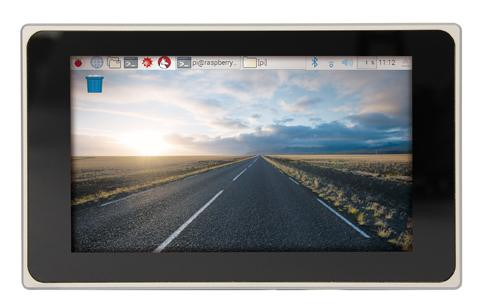MASS GmbH has launched RPI 07, a touch panel PC with a 7″ 800×480 display powered by a Raspberry Pi 3 board, and designed for industrial applications thanks to a 12V to 24V variable power input, aluminum housing, DIO with optocouplers, an optional CAN Bus and more.
- SoC – Broadcom BCM2837 quad core ARM Cortex A53 processor @ up to 1.2 GHz with VideoCore IV GPU
- System Memory – 1GB LPDDR2
- Storage – 16GB micro SD SDHC Class 10
- Display – 7″ WVGA 800×480 touchscreen display with 250cd/m² brightness, 500:1 contrast, 10-point touch
- Connectivity – 1x 10/100Mbps Ethernet, 802.11 b/g/n WiFi and Bluetooth 4.2 LE
- USB – 4x USB 2.0
- Optional Interfaces – Real-time clock (RTC), DIO with optocouplers, I²C, CAN, RS232
- Power supply – 12 to 24V DC (15W max) via 2-pin terminal with on/off switch
- Dimensions – 200 x 118 x 48mm (powder coated metal housing)
- Weight – 900 grams
- Certifications – CE
Hardware options include VESA 75 mount with pivot arm or foot,holding clamp for mounting in consoles, control cabinet doors or wall recessing, digital input card 8-bit with optocouplers, digital output 8-bit card with optocouplers, analog input card 5 channel 10-bit, and analog output card 4 channel 10-bit.
The company supports Raspbian and Microsoft Windows IoT Core for the panel PC, with other operating systems available on requests.
The company has not released availability and pricing information for the RPI 07. You may find more details on the product page.
Via LinuxGizmos

Jean-Luc started CNX Software in 2010 as a part-time endeavor, before quitting his job as a software engineering manager, and starting to write daily news, and reviews full time later in 2011.
Support CNX Software! Donate via cryptocurrencies, become a Patron on Patreon, or purchase goods on Amazon or Aliexpress. We also use affiliate links in articles to earn commissions if you make a purchase after clicking on those links.






No price. Shame.
Basically, it’s a very nice industrial class touchpanel case with options of enclosing some very useful I/O solutions in the same case.
The SD card’s going to be a constrainer. The thing halts and skips a bit if your application needs storage access- the SD has to be “right” along with you “overclocking” it on a Pi3 for it to be consistent in access speed. You’ll want a U-1 rated UHS-I card or better, and preferably an A1 rated card to make this rock.
Well
There are industrial SD’s with better life ^ don’t remember class / speed wise.
Everything I’ve been reading is that people that have tried to use RPi’s in products very quickly have major SD card problems and have to swap out cards once a year or so. There are similar products at a similar price point that come with built-in storage
SD cards wear out when (sloppily) running them under an OS that considers them an HDD: lots of writes…
Need to use an OS fully running in RAM (OpenWRT/LEDE, Openelec, …), a filesystem with wear-leveling or a combination of both.